Young at Heart Blu-ray Movie
HomeYoung at Heart Blu-ray Movie 
Olive Films | 1954 | 117 min | Not rated | Apr 08, 2014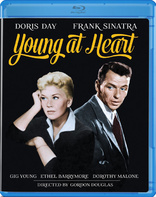
Movie rating
6.4 | / 10 |
Blu-ray rating
| Users | 0.0 | |
| Reviewer | 3.5 | |
| Overall | 3.5 |
Overview
Young at Heart (1954)
The lives and romances of three sisters in a musical family; the youngest daughter's life is complicated by the subsequent arrival of a charming composer and a cynical music arranger.
Starring: Doris Day, Frank Sinatra, Gig Young, Dorothy Malone, Robert KeithDirector: Gordon Douglas
| Romance | Uncertain |
| Musical | Uncertain |
| Drama | Uncertain |
Specifications
Video
Video codec: MPEG-4 AVC
Video resolution: 1080p
Aspect ratio: 1.66:1
Original aspect ratio: 1.66:1
Audio
English: DTS-HD Master Audio Mono
Subtitles
None
Discs
25GB Blu-ray Disc
Single disc (1 BD)
Playback
Region A (C untested)
Review
Rating summary
| Movie | 3.5 | |
| Video | 3.5 | |
| Audio | 4.0 | |
| Extras | 0.0 | |
| Overall | 3.5 |
Young at Heart Blu-ray Movie Review
If this is a fairy tale coming true, it was written by the Brothers Grimm.
Reviewed by Jeffrey Kauffman April 7, 2014Fairy tales can come true
It can happen to you
If you're young at heart.
The Academy Awards’ Music Division has been under quite a bit of scrutiny over the past few years for its sometimes
odd decisions with regard to various nominations, especially in the Best Song category. What was once an arbiter of
public taste, or at least a mirror of popular appeal, has become more arbitrary than arbiter. Two years ago, only two
nominations were proffered, an embarrassing outcome (even if one of the nominees was one of my personal favorite
musicians, Sergio Mendes, for one of the songs from
Rio). But in the Golden Era of Hollywood and well into the sixties, there were so many fantastic songs in
films that many tunes that became popular standards either didn’t win the statuette or in fact were never even
nominated. Such was the case with “Young at Heart”, the evergreen Johnny Richards-Carolyn Leigh tune that provided
Frank Sinatra with one of his biggest hits of that era. Sammy Cahn, a provider of many other Sinatra hits, at least
walked away with an Oscar that year, for having co-written “Three Coins in the Fountain” (with Jule Styne instead of
Jimmy Van Heusen, his more frequent collaborator). While the main reason that “Young at Heart” wasn’t nominated is
probably attributable to the fact that the song was not written for the film (the film in fact was named for the
song after it became a big Sinatra hit), it’s still somewhat perplexing given that one of that year’s actual nominees,
“Hold My Hand” from Susan Slept Here, was evidently also not written for the film in which it appeared,
and reportedly came out several years before it made to the ranks of cinema (and Oscar nominees). (There's
also the tangential issue that "Hold My Hand" is probably not quite in the same league with even the other
nominees from the year, let alone "Young at Heart"). The Academy’s kind of willy-nilly disposition toward
“rules” like this is evidently nothing new (Oscar junkies may recall the brouhaha that broke out after Stevie Wonder
won for "I Just Called to Say I Love You", which one of Stevie's own collaborators insisted had been written years prior
to The Lady in Red, the film in which it ostensibly debuted). Those who like to pay attention to credits in films
may be surprised to see that
neither the titular song nor any of the music gets noted (no pun intended) during the opening sequence, the
result of Warner’s Ray Heindorf not liking new industry guidelines dictating how he should be titled. That Richards and
Leigh were left out of this equation is at least a little odd, especially considering the fact that the song not only provided
the film with its title but also because its popularity no doubt helped draw attention to the film to begin with.
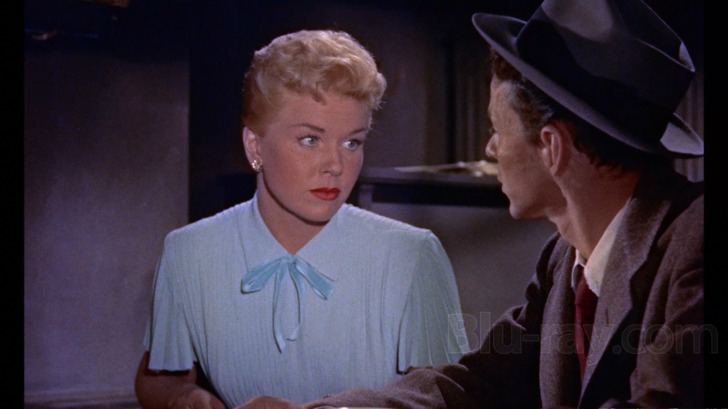
This lack of music credits is rather perplexing for other reasons, though, notably the facts that Young at Heart was trumpeted (no pun intended) as a musicalized remake of 1938’s immensely popular Four Daughters, and also by the fact that it contains Frank Sinatra crooning one of his other signature tunes, “One For My Baby (And One More For the Road”), and well as such evergreens as the Gershwins’ “Someone to Watch Over Me” and Cole Porter’s “Just One of Those Things”. Despite this perhaps inconsequential oddity, Young at Heart is a charming if rather weird at times love story which depicts the romantic travails of three daughters of a musically precocious family called the Tuttles, Laurie (Doris Day), Fran (Dorothy Malone) and Amy (Elisabeth Fraser).
The girls’ widower father, Gregory Tuttle (Robert Keith), is a big kahuna in the local music scene of the small town in which the family lives. Aiding Gregory in raising the girls is Gregory’s spinster sister, Aunt Jessie (Ethel Barrymore). As the film opens, Fran is thrilled to announce her engagement to local real estate tycoon Bob (Alan Hale, Jr., the Skipper of Gilligan’s Island fame). That sends Amy into an emotional tailspin and she asks for solidarity from Laurie, insisting that they should both become spinsters themselves rather than leave one of them behind if the other one finds true love. Laurie doesn’t seem especially excited about the proposition (so to speak), especially since she’s aware that the local plumber, Ernie (Lonny Chapman), obviously has eyes for Amy anyway.
Things get shaken up when a charming and very handsome bachelor composer named Alex Burke (Gig Young) shows up at the Tuttle home with a letter of introduction and recommendation to Gregory. All three Tuttle girls swoon more than a bit in Alex’s presence, but it soon becomes apparent that Alex is focusing squarely on Laurie, something that makes her quite happy. In fact, the two seem headed for the matrimonial aisle until Alex encounters some difficulty in arranging one of his pieces and calls for a surly orchestrator named Barney Sloan (Frank Sinatra) to come to town to lend him a hand. It’s notable that Ol’ Blue Eyes doesn’t even make his first appearance in Young at Heart until well after the half hour mark, with the first part of the film playing out as a rather standard romance between Gig Young and Doris Day. (Sinatra assumes the supporting role that made John Garfield an overnight star in Four Daughters).
Barney’s extremely talented, but he’s kind of a depressive sort, always frowning and far from friendly to any of the Tuttle girls. Even though the romance between Laurie and Alex seems to be proceeding apace, when Laurie thinks that Amy actually has eyes for Alex, she ups and elopes with Barney. It’s a decidedly odd plot development, one that really isn’t paved especially well by the screenplay, though of course in true fifties’ fashion, Laurie of course finds out that Barney is the one she’s always loved all along. That doesn’t help to ameliorate Barney’s feelings of insecurity, especially when a family reunion allows him to see Laurie and Alex interacting in what he assumes is an intimate fashion in the corner of the house one evening.
A bit of melodrama ensues, with a decidedly happier ending than the one that summed up Four Daughters (and no doubt contributed to Garfield’s Oscar nomination in the role). The film is heartfelt, if patently fake in that too clean, too glistening fifties manner, but it at least presents the only on screen pairing of two of that era’s biggest singing stars. Interestingly, both Sinatra and Day were about to have their own travails with the most famous theatrical songwriting team of the fifties, Rodgers and Hammerstein. Sinatra was all set to star in the film adaptation of Carousel, but dropped out early in production (fans know that there are some of his prerecordings for the film available). A couple of years later, tongues wagged all over Hollywood when Day—seemingly the picture perfect choice for the role—was passed over in favor of Mitzi Gaynor to play Nellie in South Pacific, a decision which still raises the hackles of “what if?” questioners. Young at Heart is certainly nowhere near the level of the great Rodgers and Hammerstein musicals, but it’s a pleasant enough outing with a cobbled together song score that allows each of the stars their moment to shine.
Young at Heart Blu-ray Movie, Video Quality 
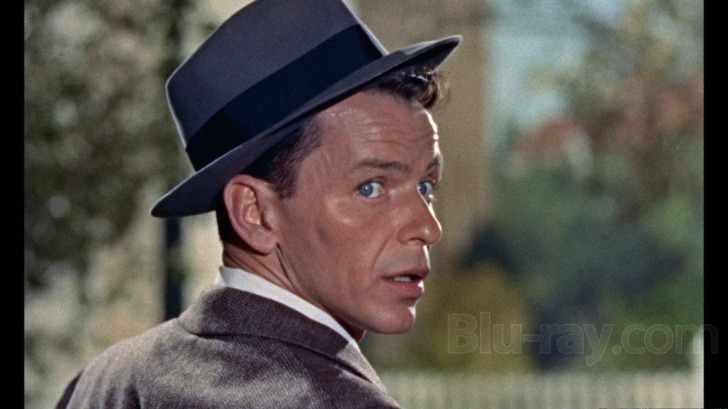
Young at Heart is presented on Blu-ray courtesy of Olive Films with an AVC encoded 1080p transfer in 1.66:1. The elements here are in relatively good shape, with no major damage other than some occasional small specks and flecks. While clarity and stability are well above average, color has faded noticeably with the expected tilt toward the brown end of the spectrum. It's actually not as bad as we've seen in some other catalog titles put out by Olive, and at least some of the occasionally drab appearance can be attributed to the typically less than spectacular looking WarnerColor. The opening Warner title card may throw some into a panic, for it's incredibly shoddy looking, but things perk up at least relatively after that. While things are relatively soft looking, as is the Olive tradition, there's a natural and organic presentation here that hasn't been digitally altered in any meaningful way.
Young at Heart Blu-ray Movie, Audio Quality 
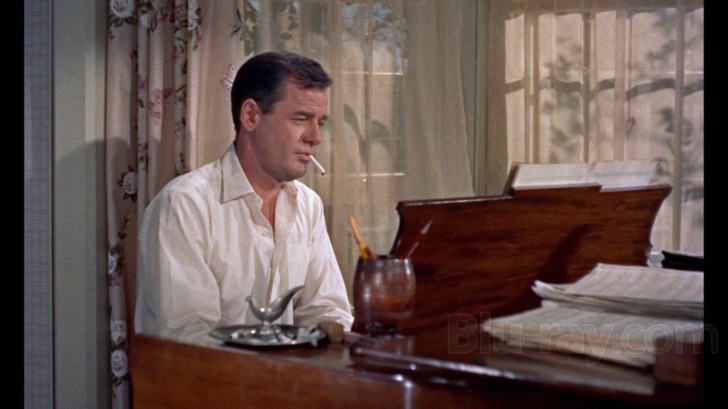
Young at Heart's lossless DTS-HD Master Audio Mono track sounds surprisingly spry for its age, though the lossless setting only makes clear how much extra reverb was pumped around the vocals of Sinatra and Day. Dialogue and Ray Heindorf's appealing orchestrations both sound clean and clear, and the track really has no damage of any import to discuss.
Young at Heart Blu-ray Movie, Special Features and Extras 
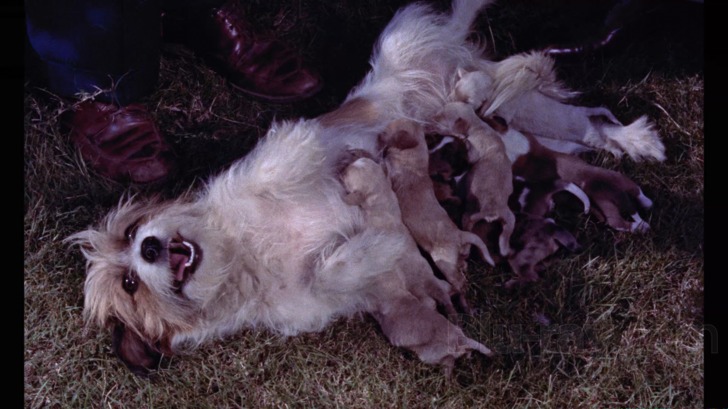
No supplements are offered on this Blu-ray disc.
Young at Heart Blu-ray Movie, Overall Score and Recommendation 
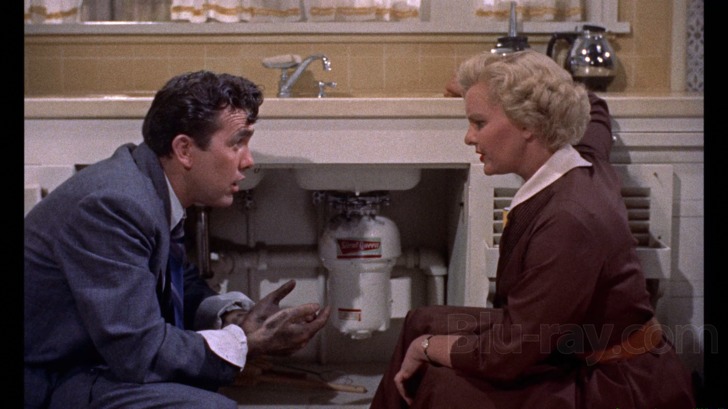
This is certainly one of the odder romantic musicals of its time, one which doesn't even introduce its putative co-star until over a quarter of the way through the film, and which then keeps him in the background for a good deal after that introduction. The plotting may be problematic, but the performances are genuine and actually quite touching. This is small scale Americana that will probably strike many as hackneyed, hokey and trite, but it's sweet in its own way, albeit with a tart edge courtesy of Barney's demeanor, and it's simply grand to be able to see Day and Sinatra sharing screen time together. Recommended.
Similar titles
Similar titles you might also like

Brigadoon
1954

Yentl
Limited Edition to 3000 - SOLD OUT
1983

The Last Five Years
2014

The Idolmaker
1980

Saawariya
2007

It's Always Fair Weather
Warner Archive Collection
1955

The Broadway Melody
Warner Archive Collection
1929

Show Boat
Warner Archive Collection
1951

Gentlemen Prefer Blondes
1953

There's No Business Like Show Business
1954

Dance, Girl, Dance
1940

West Side Story
50th Anniversary Edition
1961

Sparkle
2012

The Band Wagon
1953

Royal Wedding
1951

Bells Are Ringing
Warner Archive Collection
1960

The Glenn Miller Story
1954

A Star Is Born
1954

Gigi
1958

Rent
2005